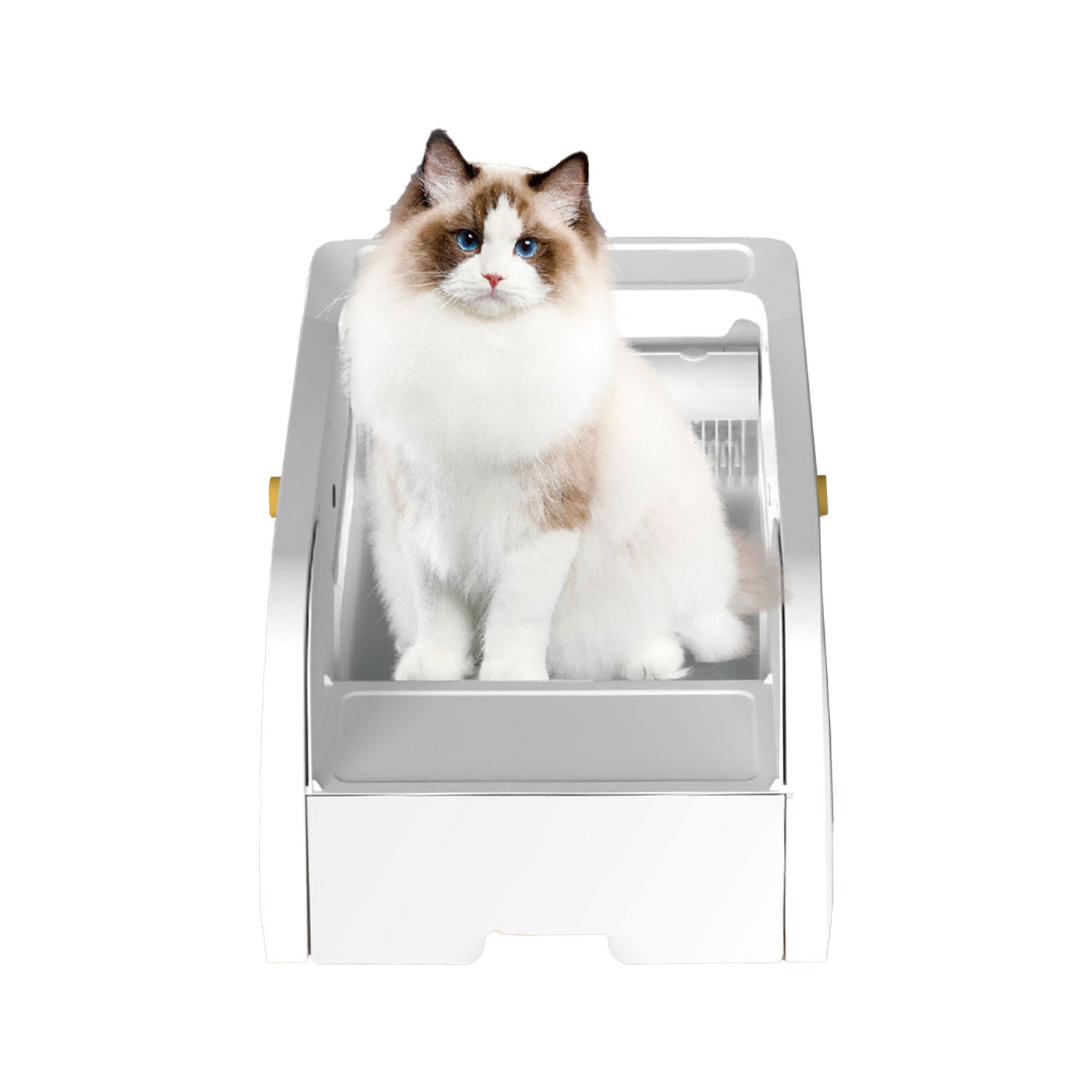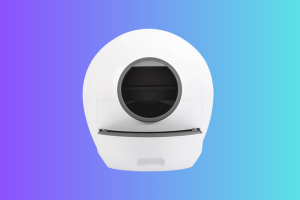Some pet parents think their feline friends act naughty when they find a little “present” outside the litter box. It feels like a cry for attention, right? But, let’s be real — it’s not some sneaky cat scheme.
It could be their desperate call for help saying…
This box is gross! Clean it, or I’m going elsewhere
I hate my new litter!
Ouch! It hurts pooping in the litter box—or I’m having a hard poo.
According to research conducted on 3106 Italian cats, about 16.47% have house soiling issues, often because of litter type, box management, and cat’s age and health.
Whether it’s a medical, environmental, or behavioral problem, you must understand your cat’s unspoken signals and promptly provide the right solution.
In this article, you’ll discover why cats poop outside the litter box and how to tackle this problem with expert tips.
Understanding the Problem
Don’t even think about googling ideas on how to punish your cat for pooping outside the litter box.
Instead, find reasons for the house’s soiling.
Trust me cats like to keep themselves clean. So, if they are showing disgusting behavior they may have serious issues.
Your cat’s bathroom breaks outside their litter box can cause serious stress and tension. It can even strain the relationship between you and your cat.
According to Dr.Lauren Harris “Cats who pee outside the litter box are 2-6 times more likely to be relinquished to a shelter.”
So, why is your cat avoiding the litter box?
Turns out, there are a bunch of reasons. Inappropriate elimination can happen because of health issues like irritable bowel disease or stress or maybe because of changing the position of the litter box and the introduction of new pets in the home.
Whatever the reason, you need to figure out the root cause — which means first ruling out any medical problems — a vet can help you out! Then you both can move on to analyzing behavioral aspects like a new family member or territorial marking.
Keep in mind, if these issues are not timely addressed they could hurt your cat’s overall health and turn your beautiful home into a messy disaster.
Common Reasons Why Cats Poop Outside the Litter Box
Cats poop in other areas rather than their litter box for different reasons. The most crucial ones are stated below.
Medical Problems
Cats are pretty good at hiding their health problems, so any subtle changes in their behavior could indicate an underlying issue. If you notice your kitty is doing her business out of her litter box, it might be due to one of these health conditions.
Digestive Problems
If your feline pal is suffering from diarrhea, they might not make it to the litter box in time. On the other hand, constipation, inflammatory bowel disease, and other gastrointestinal infections can also cause pain and discomfort, leading your cat to potty in places where they feel more comfortable and less exposed.
Urinary Tract Infections
Urinary tract infection (UTI) is a common infection that can happen in cats of any age. It is caused by bacteria in the bladder or urethra.
If your furry friend is having a UTI, they might feel an urgency to pee or defecate a small amount frequently. This can cause your cats to poop outside of their litter box.
Next time you see your cat making painful sounds while peeing or notice blood in urine, consult a vet for proper medication like antibiotics.
Arthritis Pain
If you notice your cat limping, having a hard time jumping around, and acting slow in activities that would otherwise make’em excited, your cat is probably having Arthritis.
It is more common in older cats. The joint pain and stiffness can make it super-hard for your cat to get inside their litter box or climb stairs to their designated area. As a result, they spray or poop at spots which are easier to access.
Pain or Injury
Simply leaving a window open can lead to many injuries. In other scenarios, they can be bullied by other pets around the house.
A road accident, a tail injury, or severe pain because of an animal bite can make it extremely difficult for your feline buddy to use her litter box.
Cognitive Dysfunction
Older cats might suffer from cognitive dysfunction which is more like Alzheimer’s disease. This cognitive decline causes your cat to forget the location of their litter box and they start to inappropriate elimination at odd places.
Parasites
Fleas or parasites can cause constant itching which can make your cat go crazy and leads to small peeing and pooping at random places. Because of their allergies, they might even hate a certain litter type.
Other common diseases
Similar to us, cats can also have diabetes and kidney diseases. Though it is more common in middle-aged male cats, however, any cat can suffer from this irrespective of gender or age.
Along with increased thirst, cats also experience increased levels of urination, if they have diabetes. As a result, cats find it hard to get to their litter box and pee or poop usually outside the litter box.
Cats are hygienic felines, so if they potty outside the designated area due to any of these health issues mentioned above, you should promptly schedule an appointment with a vet for a proper diagnosis. After all, they are your family and their health and wellbeing are your responsibility.
Behavioral Issues
Noticing a change in your cat’s behavior? Trust me, it’s hard to miss when they start acting weird. Just like us, cats can suffer from stress and anxiety — hey, they are sensitive little felines. When they feel threatened by someone or something, it can mess with their bathroom habits. Here are some common reasons for your cat’s sudden potty protest.
Introducing New Pet in Home
Bringing a new cat into the house — whether it’s a cat or even a dog — can ruffle your cat’s fur. Cats are all about feeling like the king or queen of their castle and they’re not exactly thrilled about forced friendship. If they feel threatened or crowded by the new addition, don’t be surprised if they show their displeasure by pooping somewhere that’s not their litter box. It’s their way of saying, “I am not AMUSED!”
A New Family Member
Imagine bringing home a new baby—the jealousy level of your cat could burst out like a volcano. Feeling ignored, they would do anything to grab your attention even if it means acting extra playful or pooping outside their bathroom.
Shifting Houses and Renovation
A change in furniture setting or construction work can make your cat feel like roaming in a puzzle. They lose track of their litter box and get easy where they find it cozy.
Multi-Cat Household
It can feel like a real “War of the Worlds” sometimes. One cat is the self-declared ruler of the kitchen, while the other guards the litter box like it’s a treasure chest.

Territorial Marking
Cats sometimes decide to poop outside of their litter box and it’s usually because they are trying to tell us something. Unlike dogs, who sort things out face-to-face, cats prefer to handle things indirectly, like by marking territory when they’re stressed in case they feel insecure about other households’ pets.
Cats mark their territory for several reasons. Mostly to let other cats know, “Hey, this is my spot!”. Unneutered cats also mark to show they’re looking for mates.
By understanding these cues, you can keep your cat comfortable and maintain their litter box habits.
Negative Association
If your kitty ever had any bad experiences with her litter box, she would avoid using that same designated area again.
Once you notice these changes in your cat’s behavior, you can try to remove the triggers causing their unusual pooping and spraying. But if things seem to be spiraling, don’t hesitate to consult an animal behaviorist. They can help establish new rules and routines to get your feline pal back on track.
Environmental Factors
The environment also plays a crucial role in your cat’s potty habits. A calm and peaceful space makes it much easier for your cat to feel relaxed and comfortable enough to do her thing without stressing out. However, certain environmental factors can disrupt that peace, such as:
Loud Noise
Imagine your cat’s finally in the litter box, handling her business like a pro when BAM! A loud noise sends her sprinting out like her tail’s on fire. Or maybe the neighbor’s kids are having one of their “let’s scare the cat moment”. To keep her bathroom routine chill and chaos-free, make sure her litter box is in a quiet, calm spot away from all the madness.
New Surrounding
Bringing a new cat into the house means setting them in a completely different territory. So, don’t be surprised if she has a few accidents especially if there are other cats around giving her the side-eye. She has to understand the house rules and figure out the best bathroom spots without ticking anyone off.
Cat Litter Box Issues
Often going unnoticed, litter box problems can affect your cat’s pooping habits. If your cat is eliminating waste despite being well-trained and knowing the location of the litter box, then it’s high time you do a litter box analysis that includes:
Size of the Litter Box
If your cat is too small or suffering from an injury, they might find it difficult to get inside her litter box with high walls. While a self-cleaning litter box can scare your cat away.
Location of the Litter Box
A cat sniffs around the litter box for a few seconds before actually getting in — it’s their way of checking things out. Cats are pretty particular about their bathroom habits, and if you have stashed the litter box in a hard-to-reach spot or somewhere cramped, they’re likely going to avoid it. I mean seriously, who wants to travel the world just to get to the bathroom?
Cleanliness of the Litter Box
Cats are among the cleanest animals around, and that obsession with cleanliness extends to their litter boxes too. One of the litter box issues is, you guessed it, cleanliness.
If you haven’t cleaned a litter box in a week, don’t be surprised when your cat flat-out refuses to step paw in there. They like their bathroom neat—no one wants to wade through a mess, especially not your fastidious feline.
Type of Litter
There are many cat litter available, and each has its pros and cons depending on your cat’s preference and needs.
For example, paper litter is a great choice for cats with an injury because it’s soft, absorbent, and gentle on sensitive paws. On the other hand, clay litter is often preferred by many cats because it gives a more natural feel.
But if you love a more biodegradable, compost, and safe solution, natural plant-based litter like HOEIWELL ‘s tofu cat litter works best.
Volume of The Litter
Cats are like tiny excavators when it comes to their litter boxes. If the litter’s too shallow, they’re going to give you that “really?” look and might decide your favorite rug is a better spot. If there’s one thing a cat wants, it’s the perfect depth to cover their treasure.
Solution and Preventative Measures
Just like us, pets can also get sick, and it’s up to us to notice when something’s off. If your feline friend is acting strange, it’s a good idea to visit the veterinarian or animal behaviorist.
A decent vet will quickly figure out if the problem is medical, behavioral, or has something to do with the litter box. They’ll help you get your furry friend back to their old self in no time.
To fully diagnose your cat, the vet might ask the following questions to assess whether it’s a medical issue, litter box problem, environmental factors, or behavioral problem that’s making your cat empty their belly outside of the designated area.
- Does their poop look different than usual (in or out of the litter box)
- Have they had any urinary or digestive problems before like infection or constipation?
- How do they position themselves when they pee outside the box?
- Do they poop outside the box? If so, where?
- Do they cover their waste in the litter box?
- Do they scratch or dig before leaving the designated elimination area?
- Several litter boxes?
- What do you use to clean up after your cat?
- Are there specific things your cat uses for peeing or pooping outside the box?
- How many pets do you have in the house? If multiple then have ever seen or heard any fights?
After a check-up, your vet will explain their findings and any test results. They’ll let you know if there’s a problem and suggest a treatment plan, which could involve medications or changes to your pet’s routine.
They might recommend follow-up visits to check on progress and give tips on keeping your pet healthy. If there are behavior issues, they’ll offer advice or refer you to someone who can help further.
Addressing Medical Issues
Some health issues are more serious than others. You don’t need to rush to the vet for a minor cough or single vomit. However, if the symptoms continue for more than 48 hours or seem severe from the start, your kitty might need antibiotics or other medications.
For more serious conditions like blockages or kidney stones, the vet might recommend surgery or extracorporeal shock wave lithotripsy (ESWL). Once your cat is back to her usual self, she’ll be able to return to her litter box routine without any fuss.
Managing Behavioral Problems
An animal behaviorist can help you figure out the root cause of your cat’s odd elimination behavior like stress or anxiety. They would suggest tips like:
- Provide a safe and secure space where they can feel cozy and comfortable.
- Create a play area or provide climbing structures or scratching posts to keep your cat mentally and physically active.
- Maintain a healthy diet and proper feeding schedule.
- Products like Feliway diffusers can help create a calming atmosphere by mimicking natural pheromones
- Ensure a fixed regular playtime and stick to your routine.
Mitigating Environmental Stress
Cats love stability. Sometimes even minor changes can lead to major litter box problems. Follow these quick tips to ensure your kitty is safe from environmental stressors.
- Create a quiet zone where they can relax and enjoy some alone time.
- Respect their sleeping schedule. Avoid keeping your TV volume too high which may disturb your cat.
- Make sure your cat has plenty of places to hide—cats love it!
- Keep the windows and balconies secure. Your cat’s outdoor trip may not be as good as they imagine it to be.
- Cats don’t like surprise renovations or unannounced roommates. Stay patient and give them a little time to figure things out.
Improving Cat Litter Box Condition
Never let your cat’s litter box go unnoticed. Follow these few must-to-do steps to reduce house soiling.
- If you have multiple pets in the house, spread your litter boxes like one on each floor or one for every pet + an extra for safekeeping.
- Keep the litter box and feeding areas separate
- Keep the litter box in a quiet place free from intrusion.
- Keep the litter box neat and clean. Scoop out the waste at least once a day and empty the entire content of the box at least once a month.
- Keep the litter depth to at least 2-3 inches.
- Enzyme cleaners are great at keeping your cat pooping on similar spots other than their litter box, as they help reduce odors and make it less appealing for them to return.
- Try different litter boxes and types to see which one works for your cat.
When to Seek Professional Help
Before you decide to take your beloved feline to the vet, look for these signs:
- Change in their poop texture (loose or different color).
- Blood in stool.
- Change in frequency of their pee or potty.
- Lethargy
- Vomiting or diarrhea
- Your cat hasn’t been eating or drinking normally.
- Makes unusual noises in their litter box.
- Weight loss
- Lumps and bumps
- Skin allergies
Conclusion
Now, you know why cats poop outside their litter box. Whether it’s a health issue, a dislike of a certain litter type, or stress from a new pet, your cat is just trying to tell you, “Hey, I need some help here!”
Pay attention to the signs, keep that litter box clean and cozy, and consult a vet or a behaviorist if things don’t improve. With time your cat will be free of her litter box issues.
FAQs
How often should I clean my cat’s litter box?
Scoop your cat’s litter box daily and give it a deep clean once a week. If you have more than one cat, clean it more frequently to keep everyone happy and your home smelling fresh.
What type of litter is best for avoiding litter box issues?
Opt for unscented, clumping litter for the best results. If you want something eco-friendly, try tofu cat litter. Just be sure to stick with what your cat likes to avoid any inappropriate elimination problems.
When should I seek veterinary help for my cat’s litter box problems?
You should seek veterinary help if your cat’s litter box habits suddenly change or if they start peeing or pooping outside the box frequently. Also, watch for signs like blood in the urine or stool, straining to go, changes in appetite, or any unusual behavior.






